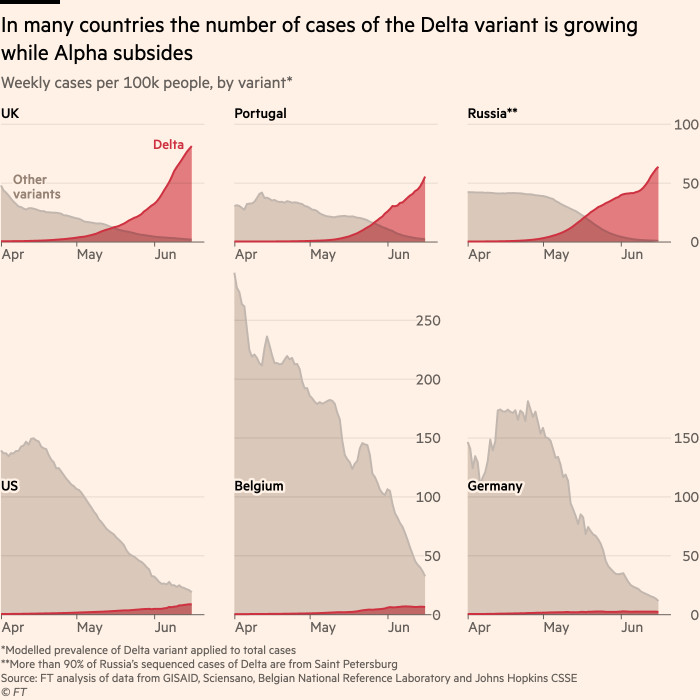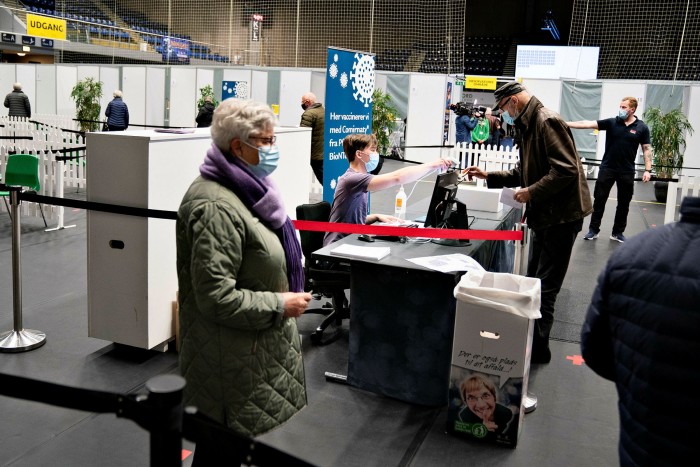[ad_1]
The Delta coronavirus variant that has swept the UK has dominated in Portugal and has appeared in clusters in Germany, France and Spain, prompting European health officials to warn that further action is needed to slow its spread.
According to the “Financial Times” analysis of the global genome data of the virus tracking database Gisaid, although this new strain that first appeared in India still accounts for only a small part of the total number of coronavirus cases on the European continent, it is making progress. Calculations by the British Financial Times show that it accounts for 96% of the sequenced Covid-19 infections in Portugal, more than 20% in Italy, and about 16% in Belgium.
The small but rising number of cases raises concerns that the Delta variant may prevent the EU from making progress in the past two months to reduce the number of new infections and deaths to at least the lowest level since the fall.
French Health Minister Olivier Véran told reporters at a Paris vaccination center on Tuesday: “We are eradicating the virus and eradicating the pandemic, and we must not let the Delta variant prevail.”
Véran said that 2% to 4% of the virus samples analyzed in France showed Delta variants: “You might say that this is still very low, but it is similar to the situation in the UK a few weeks ago.” Financial Times, UK An analysis of Gisade’s data suggests that this number may be even higher.
In Portugal, community transmission of this variant has been detected in the Greater Lisbon area, where more than 60% of the country’s new coronavirus cases have been detected in this area in the past week. Non-essential travel in and out of the city is banned this weekend to prevent a surge of cases to other parts of the country.
Scientists across the African continent are now looking at the UK-where Covid-19 cases have tripled in the past month, and the Delta variant accounts for about 98% of all new infections-to find out what might happen next and Clues on what measures may need to be taken are taken away.
After official data showed that the Delta variant appeared to increase the risk of hospitalization by 2.2 times compared to the Alpha variant, the British government this week postponed the removal of its remaining coronavirus restrictions for one month.
Lyon virologist Bruno Lina said: “The British decision to reopen life and society will become our laboratory in Europe. He advises the French government and helps coordinate mutation sequencing in the country.”
Scientists say that whether the delta infection group sweeping the European Union will evolve into a larger-scale epidemic depends in part on how many people are fully vaccinated and people’s behavior after many restrictions on life and business have been lifted.

Recent studies by the British government have emphasized the need to complete the vaccination plan as soon as possible.according to Data collected by Public Health England, The first dose of the Covid-19 vaccine is usually not as effective as the previous strain on the Delta variant. Two doses increase the protection against symptomatic Delta infection from 33% to 81%.
Although in the UK, approximately 46% of the population is fully immunized, the vaccination rate in most countries in continental Europe hovers between 20% and 30%. Approximately 26% of the French population has been vaccinated.
French authorities are currently trying to control the outbreak in the Landes area near the Spanish border. The area has confirmed 125 cases of Delta variants through genetic sequencing, and another 130 suspected cases, accounting for about 30% of recent infections in the area. In recent weeks, clusters of Delta variants have also been discovered in an art school in the southern suburbs of Paris and Strasbourg.
In each case, health officials responded in the same way: strengthening contact tracing and re-promoting people in affected areas to vaccinate.
French virologist Lena said: “If we maintain a good vaccination rate and take some non-pharmaceutical interventions indoors, such as masks, we can still suppress the spread of the virus this summer.” “This mutation will replace others. Mutation-we must keep this in mind-but that doesn’t mean it will lead to a new wave of fashion.”

Some scientists worry that the Delta variant may have spread farther without being discovered, because less genome sequencing has been done to identify the variant in continental Europe. The UK has sequenced more than 500,000 Sars-Cov-2 genomes, while Germany, France, and Spain have sequenced approximately 130,000, 47,000, and 34,000, respectively.
Antoine Flahault, director of the Institute of Global Health at the University of Geneva, said: “It is costly, time-consuming, and neglected.”
However, Denmark has sequenced a high proportion of cases, but still only a small number of delta infections have been identified, even though the variant arrived in the country almost at the same time as the UK.
Experts say this can be partially explained by differences in demographics and population movements, including the number of cases imported into the country from high-endemic areas such as India, and the living conditions of the sowing communities.
Jeff Barrett, director of the Covid-19 Genomics Program at the Wellcome Sanger Institute in Cambridge, said that the spread of deltas in European countries is still “a bit mysterious.”
Nevertheless, many experts believe that no matter where the Delta variant is introduced, it will eventually dominate. They said the key is to increase the proportion of people who are fully vaccinated while slowing the spread of the virus as much as possible.
“We have to convey the message very clearly,” said Lena of Lyon. “It’s not over yet.”
Additional reporting by Daniel Dombey, Peter Wise, Guy Chazan and Clive Cookson
[ad_2]
Source link



